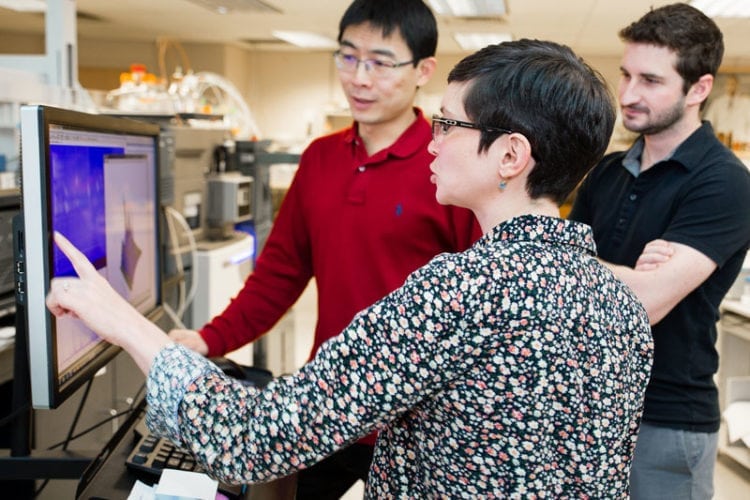
There is a rich tradition of stories that begin with…“we were sitting in a bar talking, when we got this idea.”
From the Marine Corps, to the Ironman Triathlon, and even Quidditch, all have their roots in legendary stories about beginning in a conversation in a bar. We may one day come to tell stories of the breakthrough in antibiotic resistant bacteria that began at U District’s College Inn.
Last fall, in a tradition that harkens back to Dean Sid Nelson, UWSOP’s junior faculty began a regular outing to share ideas, research, and good spirits. “The event is called MEH,” said Brian Werth. “It stands for Monthly Early-career-investigator Happy hour.” “Brian and I were talking at one of these events,” said Libin Xu, “and we suddenly realized there might be an opportunity for us to work together on some novel research into antibiotic resistance. We saw that my expertise in ion mobility-mass spectrometry (IM-MS) analysis of lipids and Brian’s expertise in antibiotic resistance could help us understand the mechanisms behind this resistance because many of the antibiotics target the bacterial cell membrane and cell wall.”
Brian and Libin were named the first UWSOP Faculty Innovation Fund Award recipients. The new fund encourages high-risk, innovative research projects.
Brian is a specialist in antibiotic resistance and is unusual in that he has a PharmD as well as an acute care residency at Queen’s Medical Center in Hawaii and a two-year infectious disease fellowship at Wayne State University in Detroit.
Libin, a specialist in mass spectrometry, lipid peroxidation and lipid metabolism, completed his Ph.D. in Organic Chemistry at University of Illinois at Chicago and was a Postdoctoral Fellow at Vanderbilt University. “Antibiotics are one of few curative drugs we have,” notes Brian, “and they are the only drug that the more we use them, the less effective they can become.” That diminished return makes antibiotics a shared public health resource—and the recent increases in antibiotic resistant strains of bacteria such as MRSA a grave concern.
Antibiotic resistance affects over two million Americans and results in over 23,000 deaths per year according to U.S. Centers for Disease Control. By looking at bacteria at the molecular level, Brian and Libin are seeing that resistance to different antibiotics leads to characteristic changes in the lipid compositions of the cell membranes of bacteria. The specific changes to the membranes depend on the antibiotic to which the bacteria have been exposed.
This breakthrough could lead to novel intervention strategies such as modifying the lipid components of bacteria’s cellular membranes to make them susceptible to antibiotics again, as well as diagnostic tools that could improve clinicians’ abilities to select the best drugs for certain types of bacterial infections.
Read an update about the Royalty Research Award funding presented to Werth and Xu to support this project.
To study with researchers like Drs. Werth and Xu, click on the links for more information about our Graduate Programs in Medicinal Chemistry, Pharmaceutics, Pharmaceutical Outcomes Research and Policy, and Biomedical Regulatory Affairs.